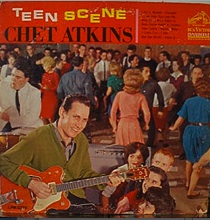| Teen Scene | ||||
|---|---|---|---|---|
 Cover of the original 1963 LP | ||||
| Studio album by | ||||
| Released | 1963 | |||
| Recorded | RCA 'Nashville Sound' Studios, Nashville, TN | |||
| Genre | ||||
| Length | 26:29 | |||
| Label | RCA Victor LSP-2719 (stereo), LPM-2719 (mono) | |||
| Producer | Anita Kerr | |||
| Chet Atkins chronology | ||||
| ||||
| Pickwick reissue cover | ||||
 LP cover of 1975 Teen Scene reissue | ||||
| Review scores | |
|---|---|
| Source | Rating |
| AllMusic | |
Teen Scene is the twenty-first studio album by American guitarist Chet Atkins, released in 1963. It was nominated for a Grammy Award in 1964 for Best Rock and Roll Recording but did not win. It reached No. 93 on the Billboard albums chart. [2] The album was reissued in 1975 on the Pickwick budget label.